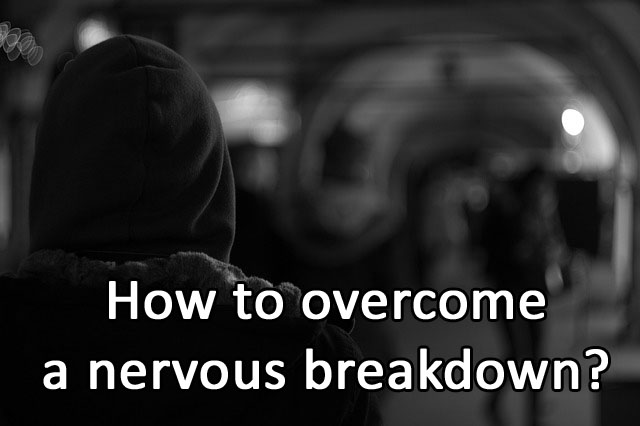How to overcome a nervous breakdown?
Caution : You must consult your doctor for your health. This page presents only a personal and alternative point of view which should not be considered as an attempt to prescribe medicine.
After understanding the functioning of depression and the inevitable consequences of an atmospheric pressure drop of the body's most important physiological gas, CO2, it is easy to understand the origin and causes of nervous breakdown (physical and psychological).
CO2 and oxygen are the most important couple in the human body.
It is indeed him, through the process of respiration that allows the production of energy.
This is also called energy metabolism, that is, the sum of internal processes that turn air and food into energy.
This energy production and this energy pressurization take place precisely in the cells.
If the CO2 pressure is correct, then the energy produced is high.
If ever there is an atmospheric depression of CO2 (less than 40 seconds on the test), the energy production will be lower, and the pressure will decrease.
In other words, it's the beginning of atmospheric (CO2) and energetic depression.

What to do ? Reduce stress and hyperventilation
The major cause of any depression is excessive stress, whether physical or mental.
Stress is the sworn enemy of energy metabolism.
Stress steals the energy produced, but especially disturbs the process of energy production itself.
Stress greatly reduces the CO2 pressure.
Biologically and physiologically speaking, this is quite obvious.
Stress triggers a flight or fight reaction in the reptilian brain, the brain which is in charge of our survival.
In the face of danger, the animal brain will use 3 basic physiological processes to get into action.
First, it will speed up the breathing rhythm.
Secondly, it will increase blood pressure and finally, it will accelerate the heart rate.
It's a basic reaction to every stress, whatever it is.
What interests us most here is the acceleration of the breathing rhythm or the pulmonary ventilation.
As we have obviously seen on the "Symptoms of Depression" page, the oxygen pressure NEVER changes in the body, whether you are stressed or extremely calm, or even in deep meditation.
On the other hand, the CO2 pressure is extremely sensitive to pulmonary ventilation.
The faster you breathe (and a lot), the more CO2 you release (the CO2 pressure decreases).
The more you breathe calmly (and less), the more CO2 you accumulate (the CO2 pressure increases).
Stress acts directly on our breathing and thus on the CO2 atmospheric pressure throughout the body.
The more we are stressed, the faster we breathe, and the lower our CO2 pressure, the more depressive symptoms will appear.
If you are stressed once in a while, the body will quickly restore atmospheric pressure.
On the other hand, if you are stressed daily, you can as well say welcome to depression because it will soon create an internal storm.
The ultimate cause of depression is chronic hyperventilation, which lowers CO2 pressure in the body.
This chronic hyperventilation in itself is caused by chronic stress.
As we will see, this stress has many sources.
How to manage hyperventilation
According to Dr. Buteyko and his team of other Russian doctors, if you have less than 40 seconds to test, you hyperventilate.
In concrete terms, your reptilian brain always perceives a surrounding stress.
It can come from many horizons.
You inherit your mother's stress
It all starts in your mom's womb.
At that moment, you did not have lung breathing yet, but you were connected to your mother's blood system.
For 9 months, you have breathed as your mother breathes.
You had the same CO2 pressure in your blood.
Whenever your mother is hyperventilated by stress, she lowers her CO2 pressure, and also yours.
You have inherited the same breath, and especially the same stress as your mother.
If your mother was anxious, you came into the world with the same anxious nature.
You have been growing up with this same nature until today.
Of course, if your mother was depressed, your chances of being or becoming so are much greater.
Nothing to do with genetics here, everything comes in the same way to breathe (more or less fast).
You are born in stress?
The moment of birth is extremely important in the life of an individual because he will determine the rest of his life.
In some cultures, particularly in Asia, India or Africa, children are born in peace.
It is often a member of the family, especially an elder who will take care of the delivery.
The mother stays in the comfort of her home with the people she loves and with whom she feels good with.
Stress is at a minimum.
Then the child comes into the world easily and silently.
This concretely means that a newborn is not obliged to cry at birth. In many ancient cultures, the child moans without uttering a single cry, which is arguably a sign of a total absence of stress.
Things have changed a lot today.
Not only are most moms stressed and anxious given the world we live in today.
The child already perceives the stressful world in which he will soon be landed ...
The mother at the time of delivery has to go to the hospital, cold place and far from being soothing for all the women.
Surrounded by several "hooded" doctors, she must relax by "opening" her genitals in front of strangers.
In such a stressful situation, the dilation necessary for childbirth is not always at the rendezvous, which causes enormous stress for the child who sometimes finds himself with a feeling of suffocation.
The hyperventilation of the mother is at its height and that of the child too.
If despite everything, the mother has been able to breathe and manage her stress, the child finally comes into the world.
In some cases, he will spin a good tracing on the buttocks to make him "breathe."
This will cause him to cry thereby, causing immediate hyperventilation and a drop in CO2 pressure.
This essential moment will mark the child with a hot iron.
The signature of his birth will be inscribed in his breathing process.
Emotional shock?
Physical or verbal aggression, tension in the family circle, loss of a loved one, in short all the emotional shocks and all these negative emotions will quickly drop the CO2 pressure in the body.
These great emotional stresses are highly terrible for breathing.
They literally change the atmospheric pressure of CO2 and cause chronic hyperventilation.
It started in the mother's womb, then at birth, and finally until today.
Life has been able to attack you from an early age.
Indeed, life does not always make gifts and offer its share of suffering.
But emotional shocks can also make you stronger if you have the state of mind to transmute and transcend them.
Here, only faith and spirituality can allow the spirit to sublimate itself in the face of the vagaries of life.
That's why people turn quickly to spiritual teaching after great emotional suffering.
This was obviously my case. We will talk about it again soon.
Environmental pollution
Pollution is a huge stress on the human body.
There is the one we breathe in car exhausts and the one we eat with foods saturated with toxic chemicals (fertilizers, pesticides, GMO, etc.).
All these molecules will irritate our mucous membranes and create inflammation.
Inflammation is a huge stress for the reptilian brain, which must fight for its survival.
A highly polluted organism is often reflected in digestion.
If you have problems with digestion, gas, indigestion, heaviness, irritation, abdominal pain, diarrhea, constipation, bloating, acid reflux, etc., this indicates a great stress in the body, and therefore a hyperventilation that will bring down the level of CO2.
In addition, you should know that depression has a major hormonal cause.
Indeed, it is characterized by a low production of serotonin (well-being hormone) and dopamine (happiness hormone).
These two hormones that are crucial for curing depression are made in the intestines!
95% of serotonin and 50% of dopamine are produced by the nerve cells lining the intestines.
And yes! We understand here the extreme importance of food, but especially to avoid all unmanageable pollution.
I will soon explain to you how to do it.
The natural treatment to overcome the nervous breakdown
We have seen on the previous pages that the natural solution to cure chronic depression is to increase the CO2 atmospheric pressure in the body.
This is to eliminate the stress as much as it is that drops the CO2 pressure because of the hyperventilation triggered by the reptilian brain.
The natural treatment is simple: reduce stress and increase its energy / CO2 pressure.
This will necessarily pass by what I call the winning trilogy!
First, it will be essential to review one's thinking and change one's psychic attitude.
Secondly, it will be necessary to completely revise its food style to naturally heal its intestines.
Finally, it is probably the most important because it will simply repackage his breathing to stop chronic hyperventilation and breathe normally.
If you have less than 40 seconds to test, then it can be said that you breathe too much and too fast.
A work on breathing will be PRIMORDIAL to normalize the CO2 pressure.
This is probably the most difficult part because as we have seen, it goes back even before our birth, already in the belly of our mother.
It is sometimes a heavy legacy of stress, and a heavy respiratory conditioning, which will gradually be normalized with time.
❤ The ultimate guide to breathing
Intermittent Breathing : Discover the method to quickly relieve your anxiety and chronic fatigue (positive effects from the first use).Read also :
Previous article : Depression: physical and psychological symptoms + TEST
Next article : What to do to stop depression?

